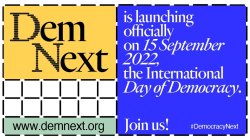Update: demnext.org now has a video of the launch event. There is also a link to an article by Hélène Landemore and Claudia Chwalisz offering sortition as an alternative to the way that the failed Chilean constitutional proposal was generated (and a tweet-thread with a summary in English.)
 DemocracyNext is a new organization featuring a “Who’s Who” of the sortition circles. DemocracyNext‘s press release announcing its launch is here. Some excerpts:
DemocracyNext is a new organization featuring a “Who’s Who” of the sortition circles. DemocracyNext‘s press release announcing its launch is here. Some excerpts:
DemocracyNext, a new non-profit, non-partisan research and action institute, which announces its foundation this International Democracy Day, 15 September 2022 – aims to actively help this new democratic paradigm take shape and take hold.
“We believe that another democratic future is possible. We want to design and build new institutions where citizens can hold real decision making power,” said Claudia Chwalisz, chief executive of DemocracyNext. “Our point of departure is that the current electoral system is broken beyond repair. An entirely new framework must be based on full participation, citizen representation by lot, and real deliberation.”
Anyone interested in learning about a new way countries could be run is welcome to join DemocracyNext’s virtual launch event here on 15 September from 17:00-18:30 CET (11am-12.30pm EST). At the event, Chwalisz will introduce the team, strategic advisors and members of the Advisory Board. She will also lay out some early plans: engagement with President Joe Biden’s Spring 2023 Summit for Democracy, projects to democratise the governance of economic institutions, university research collaborations, and the creation of a Citizen Confidence Index.At the heart of DemocracyNext’s vision is modern inspiration from the ancient Athenian ideal of sortition: the random selection of equal citizens taking turns to legislate, judge, and act in the name of the community. As a research and action institute, it will aim to inform and empower the growing wave of global interest in such democracy by lot over the past decade, notably the flourishing of Citizens’ Assemblies, almost 600 examples of which have successfully tackled tough issues from Iceland to France, and from Ireland to the Philippines.
“We want to create a more just, joyful and collaborative future. Sortition does this by giving people agency, dignity, and equality, and by giving the community solutions based on collective wisdom and finding common ground,” said Dr. Hélène Landemore, a strategic adviser to DemocracyNext, professor of political science at Yale University and author of Open Democracy: Reinventing Popular Rule for the Twenty-First Century.
Also joining DemocracyNext’s strategic advisers are Jon Alexander, author of Citizens and Co-Founder of the New Citizenship Project and Mark Cridge, CEO of the National Parks City Foundation and former CEO of mySociety. DemocracyNext’s global board of advisers and democratic innovation pioneers includes Nicole Curato, Panthea Lee, Brenda Ogembo, Art O’Leary, Hugh Pope, Alice Rawsthorn, Felipe Rey, Robbie Stamp, Olúfémi O. Táíwò, Ece Temelkuran and David Van Reybrouck.
Filed under: Academia, Applications, Athens, Deliberation, Press |



Eye-gouging graphic design aside, this seems like a positive development!
LikeLiked by 1 person
The mission statement is pretty impressive – “electoral system is broken beyond repair”, “the random selection of equal citizens taking turns to legislate, judge, and act in the name of the community”.
What seems missing is more explicit language about the problems with the status quo. What are the consequence of the fact that the system is broken? Without saying exactly what’s wrong, it is much harder to fix it.
LikeLiked by 2 people
[…] protest in France. Academics have continued publishing papers and opinions on the pros and cons of sortition (unfortunately often rehashing very well hashed material) but applications of sortition […]
LikeLike